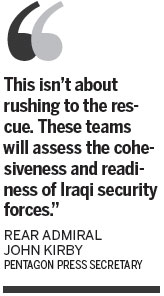US military advisers arrive in Baghdad
The first of up to 300 US military advisers began their mission in Baghdad on Tuesday, tasked with helping the Iraqi government tackle the massive Sunni insurgency that threatens the country.
According to the Pentagon press secretary, the primary task of the advisers is to evaluate the state of the Iraqi forces and their ability to defeat the Islamic State of Iraq and the Levant jihadi group, which has swept across western and northern Iraq. The US advisers will not be expected to turn the tide in the anti-insurgency effort.
"This isn't about rushing to the rescue," Rear Admiral John Kirby told reporters.
"These teams will assess the cohesiveness and readiness of Iraqi security forces ... and examine the most effective and efficient way to introduce follow-on advisers," Kirby said.
The US troops, which include special operations units, will relay their findings to commanders within "the next two to three weeks".
Two teams of about 40 troops, which were drawn from the US embassy in Baghdad, "have started their new mission", Kirby said.

An additional 90 troops have arrived in Iraq to set up a joint operations center in the Iraqi capital and another 50 are due to deploy in the next few days, he said.
Combined with troops already stationed at the US embassy and others sent to bolster security there, the US military's presence in Iraq now stands at about 500, officials said.
Iraqi Prime Minister Nuri al-Maliki said on Wednesday he is committed to a parliamentary session planned within a week that will start the process of forming a new government.
However, he ruled out forming a national emergency government to confront the ISIL insurgency.
"The call to form a national emergency government is a coup against the constitution and the political process," Maliki said in a televised address.
"The dangerous goals of forming a national emergency government are not hidden. It is an attempt by those who are against the constitution to eliminate the young democratic process and steal the votes of the voters," said the Iraqi leader.
In a worrying development for Maliki on Wednesday, ISIL fighters at a key town on the Syrian border made a local pact with fighters from the Nusra Front - an al-Qaida offshoot in Syria.
The two groups are both offshoots of al-Qaida but have been fighting each other in Syria for much of the past year, where they both seek to bring down the Syrian government. If a new cross-border alliance holds, it could strengthen ISIL's hand in the fight against Iraqi government forces.
AFP - Reuters
(China Daily 06/26/2014 page11)












